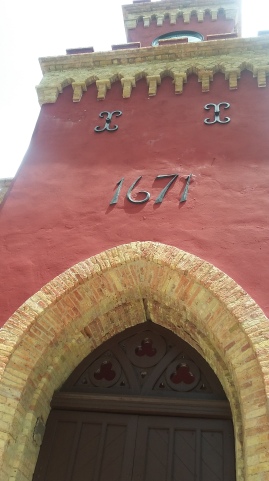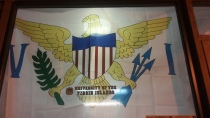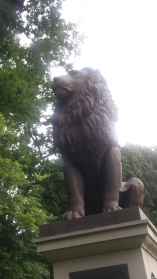The theme for the second Fellow-Me! encounter in Bremen – Shifted Objects, resonates with me; I am the topic in the same way that I am my ancestors, who were considered nothing but objects to be shifted for profit in the three centuries of European trafficking, domination and exploitation of African bodies during the Holocaust of enslavement. The post-colonial trauma of this Holocaust has been reverberating over the past two centuries and inspires my revolutionary standpoint politics.

While many historians erroneously start Caribbean history with the colonial encounter of Europeans with the local native populations, this point of departure only serves to compound the severe identity crisis from which the region is still suffering. A more accurate introduction is an acknowledgement that Africans used the natural movement of the trade winds to travel and culturally interact with the Tainos, hundreds of years before the arrival of Christopher Columbus who mistakenly asserted that he discovered the “West Indies” (van Sertima, http://thehouseofsankofa.com/books/Ivan-Van-Sertima-They-Came-Before-Columbu.pdf) .
![20160809_220622[1]](https://i2.wp.com/culturetransfer.files.wordpress.com/2016/08/20160809_2206221.jpg?ssl=1&w=450)
Furthermore, the Africans enslaved in the Holocaust, emerged from several civilizations, whose advancement vis-à-vis Europeans’ makes it shocking that they were duped for centuries into complicity – along with Arab enslavers – with their own oppression. The races were definitely not equal in one fundamental regard; African middlemen were greedy for guns and rum, which constituted their principal reward for capturing and trading their fellow continental citizens whereas Europeans were galvanised by racism, capitalism and the power afforded them to conquer Africans for intergenerational profits.

This has been a costly enterprise for the African Continent, which has been chronically underdeveloped as a consequence (Rodney, 1973, http://abahlali.org/files/3295358-walter-rodney.pdf) in the process. Colonialism was extraordinarily profitable for the protagonists of this dehumanizing, objectifying endeavor, which fueled the Industrial Revolution in Europe.
Despite this inversion, many detailed accounts of the Euro-American Industrial Revolution elide the connection between colonialism and the extraordinary profits derived therefrom and the acceleration of these continents’ development (http://images.google.de/imgres?imgurl=http://cdn.historydiscussion.net/wp-content/uploads/2015/07/AB252179-2161-4E31-A8A9-CB67560AD369.jpg&imgrefurl=http://www.historydiscussion.net/history/industrial-revolution/history-of-the-industrial-revolution/1784&h=768&w=1024&tbnid=6ykZGgeEAqT2EM:&tbnh=90&tbnw=120&docid=ytrUOUBwgBrfiM&usg=__8pWwsg5gbVQXJGjwiJ8UqXIs5KM=&sa=X&ved=0ahUKEwjw45ab17POAhUJYJoKHa9VDbcQ9QEIKTAD).

Colonial connections of the Industrial (r)evolution
However, it does not take rocket science to figure out that it was by enriching themselves from the human and material resources garnered from Africa and colonies in the Caribbean, North and South America and Asia that these nations were able to leverage their wealth and power from backward agrarian status to mechanisation and capitalism.

2017 will mark the centennial of the sale of the Virgin Islands and its citizens to the United States of America or $25 million (over $509 million in today’s money). This anniversary inspired the Flensburg Maritime Museum’s formulation of the project Koloniales Erbe-Colonial Legacy, which seeks to document an African Caribbean perspective on Danish colonial legacy in Flensburg, Virgin Islands of the US and Ghana.COLONIAL LEGACY SØNDERJYLLAND-SCHLESWIG is a joint project of the Flensburg Maritime Museum, Museum Sønderjylland – Cultural History Aabenraa and the Collection Schleswig of the Danish Central Library Flensburg.The overall project “Colonial Legacy” is co-funded by KursKultur with the support of partners of the Region Sønderjylland-Schleswig, the Danish Cultural Ministry and the Ministry of Justice, Culture and European Affairs of Schleswig-Holstein. This project is also funded by the European Regional Development Fund.
Danish colonialism is usually told – or repressed – from a Eurocentric point of view. My job is therefore to interrogate Denmark’s s attempt to erase one hundred and seventy-five years of ruthless colonial participation in the institution of enslavement. In the 1917 sale transaction, emancipated Africans were seen as expendable since they had served the purpose of enriching Denmark with their unremunerated labour. Maintaining the islands would have threatened the security of their enormous fortune in the aftermath of emancipation. Supporting wagd labour of Africans would have obliged expenditure, which was obviously not a desirable development. The consequent question of uncertain citizenship, a direct result of the US acquisition of these three strategically located islands, is of considerable concern to the Virgin Islanders.
It is also important to trace the process of Danish colonial intervention in Ghana, which entailed the acquisition of considerable human and material capital. The wealth generated from the unremunerated production and reproduction of Africans on plantations in the Caribbean was derived from the oppression and exploitation of multiple millions of men, women, girls and boys. Protagonists of racialised Empire considered Africans objects of domination; their so-called owners who bought and sold them for centuries, shifting their bodies around as if they were nothing more than inconsequential, dehumanised scraps.
Denuded of their identity garb, branded as property, forced to labour and reproduce to multiply their utility value, Africans were coerced into mental, physical and spiritual conceptions of themselves as inferior to their enslavers in a reversal of reality so profound that the detrimental effects remain to this day. And unless we remember, with critical consciouness, we are doomed to repeat this Holocaust. As Marcus Garvey said in this regard, “A people without knowledge of its past is like a tree without roots.”

Marcus and Amy Jaques Garvey: a winning team. Amy edited and published Marcus’ Philosophy and Opinions
In producing this project, I am inspired by Nina Simon’s suggestion that museums should be participatory in content and methodology to be relevant to their audiences. As she emphasises
audience-centric design processes start by mapping out audiences of interest and brainstorming the experiences, information, and strategies that will resonate most with them” (http://www.participatorymuseum.org).

This approach resonates with me because I have been practising Participatory Action Research (PAR) for years. This methodology is reflected in the interactions I recently had with research participants with whom I have been engaged in the Virgin Islands and in Flensburg and will do shortly in Ghana.

The consultative engagement revealed that Africans were not hapless victims despite their intimacy with European oppression and exploitation. Bamboula represents this spirit of resistance, which informed persistent African revolt against the entrenched practices of European demoralisation. I met with some seventy persons in the Virgin Islands in round tables and individual discussions in order to find out their views on Danish and, as it turned out, USA colonialism. I endeavoured to figure out what they would want to see included in the proposed research outputs. The responses to this outreach were overwhelming.
Notably, in St. Thomas, Senator Myron D. Jackson, his assistant Ayesha Morris and Legislature staff facilitated two round-table consultations with significant community participants, which produced extraordinary content. This data will inform the exhibition and paper. Kudos to all who so generously shared their views, intelligence and were receptive to the proposal to actively participate in the traveling exhibition.

I recently started a similar process in Flensburg in the World Cafe presentation and will continue this consultation in Ghana at the end of the year. This traveling exhibition will therefore reflect the views of the audience whose contribution to the formulation of the content of the exhibition demonstrates an interrogation of the traditionally hierarchical relationship between curator and audience.

In Flensburg, formerly a part of Denmark (now Germany) there is little or no knowledge about the progeny of the people who their progenitors oppressed and exploited. This ignorance is exemplified in the staging of the annual Rum Regatta, as a celebration of the “local” production of rum. There is little awareness that this family day ritual is directly related to of the ravaging of the human and natural resources embodied on the Caribbean sugar plantation, the quintessential space of European debauchery.

Denmark’s colonial involvement incorporated the three spaces of the infamous Transatlantic Triangle among Europe, Africa and the Caribbean.The shifting of objects – principally of violence – and human subjects who were objectified and dehumanised to justify this enterprise, demonstrated the de-moralising dimension of Euro-Arab-African complicity in a peculiar form of criminality.
Ships leaving Europe first stopped in Africa where they traded weapons, ammunition, metal, liquor, and cloth for captives taken in wars or raids. The ships then traveled to America, where slaves were exchanged for sugar, rum, salt, and other island products. The ships returned home loaded with products popular with the European people, and ready to begin their journey again (http://images.google.de/imgres?imgurl=http://www.mrdowling.com/images/710slaves2.png&imgrefurl=http://www.mrdowling.com/710-slavery.html&h=338&w=300&tbnid=5a_8aw84qsC9PM:&tbnh=122&tbnw=108&docid=bp1zT2NOWbMmLM&usg=__zvsUjwGCH4S3l7OwZUZvAyDihrw=&sa=X&sqi=2&ved=0ahUKEwjCk6bA5rHOAhUiLcAKHWCxDq0Q9QEILzAD).
This reference does not mention that Europeans also profited from human trafficking, and unequal exchange of goods like gold, ivory, spices and wooden objects, which were undervalued in Africa. Yet the concentration of colonial activities in Ghana and the Virgin Islands resulted in the extraordinary enrichment of countries like the Northern European Empire of Denmark.
Contact: Dr. Imani Tafari-Ama
tafari-ama.imani@stadt.flensburg.de

















 ©
©








